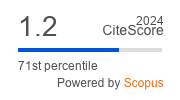Hermeneutics of Lázaro in The Labyrinth by Buero Vallejo
DOI:
https://doi.org/10.29038/eejpl.2021.8.2.penKeywords:
Buero Vallejo, drama, Lázaro in the Labyrinth, trauma, emotional intelligence, acceptanceAbstract
This play contributes to a better understanding of the psychological mechanism of behavior with respect to recurrent auditory hallucinations and the traumatic origin that can cause it, such as experiencing a violent event. This causes an emotional blockage of fear in the actor, due to the defense mechanism of denial, with repercussions on memory and negative feelings of guilt and shame. The author proposes an adequate emotional management for the protagonist, Lázaro. The solution is aimed at making him dare to know the truth and accept it following current clinical psychological praxis, without taking refuge in the protection of others. In this way, he will improve and may even reduce the emotional state and the hallucination. In the analysis of the work, various contents are decoded. First, the planes of reality: the physical world, the fantasy world and the inner world of the characters. Second, the trauma lodged in the subconscious and auditory hallucination. Third, relationship of defense mechanisms, emotional intelligence and memory. Fourth, plot about love relationships. Fifth, the psychological mechanisms in favor of justice and truth. It is proposed how this drama could have contributed to the social imaginary to raise awareness about the emotional management of individuals. The results indicate that this symbolic and complex work of form and content also contributes to solving other human dilemmas such as the limitation to know reality, in addition to the feelings and emotions in the subconscious, as well as to accept them. It is discovered how to cope with an ethical sense of justice in a society in democratic transition, with still open wounds that derive from a war. Also, there is the aspiration to a humane society on the part of the author.
Downloads
References
Aguilar López, A. M., Miguel Borge, M. (2021). Female roles in la Cinta Dorada by María Manuela Reina and models of the world. East European Journal of Psycholinguistics, 8(1), 41-56. https://doi.org/10.29038/eejpl.2021.8.1.agu
Alvar López, A. (2000). Buero. Las puertas del drama: revista de la Asociación de Autores de Teatro, 2. http://www.aat.es/pdfs/drama2.pdf
Angarita R., E. (2011). A propósito del mito de la caverna de Platón. Psicoanálisis XXIII (2), 103-109.
Aristóteles (1992). Poética. Gredos. Edición trilingüe de Valentín García Yebra.
Aristóteles (2018). Metafísica. (2018). Edición trilingüe a cargo de Valentín García Yebra. Gredos.
Branden, N. (2008) El respeto hacia uno mismo. Paidós.
Bisquerra, R., Mateo, A. (2019). Competencias emocionales para un cambio de paradigma en educación. Editorial Horsori.
Castiel, S.V., Sibemberg, A. D.P., Firpo, L.S. (2012). Defensa y trauma: del proyecto a la actualidad. Ágora: Estudos em Teoria Psicanalítica, 15(1), 63-77 Retrieved from https://psiquiatria.com/trabajos/usr_8572959916877.pdf
Del Castillo, J. (1998). Buero es el escenario de la vida. Tribuna de actualidad, 549, 58-59.
Etcheverry, J. L. (ed.) (1986). Sigmund Freud. Obras completas, 12. Amorrortu.
Ferro García, R. (2000). Aplicación de la terapia de aceptación y compromiso en un ejemplo de evitación experiencial. Psicothema, 12(3), 445-450. Retrieved from https://www.redalyc.org/pdf/727/72712318.pdf
Freud, S. (1920/1961) Beyond the pleasure principle. In Strachey J (Ed.). WW Norton.
Freud, A. (1936). Ego and mecanism of defence. Routledge.
Freud, S. (1975). Totem und tabú, Fischer, Studienaus-gabe, IX.
García Carzón, J.I. (1986). Lázaro en el laberinto. Apasionante parábola de Buero Vallejo sobre el amor y el miedo. ABC, 20.
Goffman, E. (1997). La presentación de la persona en la vida cotidiana. Amorrutu editores.
Goleman, D. (1995). Inteligencia emocional. Kairos.
Hayes, S. (1984). Making sense of spirituality. Behaviourism, 12, 99-110.
Hayes, S. C., Strosahl, K. D. & Wilson, K.G. (1999). Acceptance and commitment therapy. Guilford Press.
Hayes, S. C., Barnes-Holmes, D. & Roche, B. (Eds.). (2001). Relational frame theory: A post-Skinnerian account of human language and cognition. Kluwer Academic/Plenum Publishers.
Kübler-Ross, E. (1969). On Death and Dying. McMillan.
LaCapra, D. (2009). Historia y memoria después de Auschwitz. Prometeo.
Lancelle, G. (2002). La autoestima. Intercambios papeles de psicoanálisis/Intercanvis: papers de psicoanàlisi, 8, 53-58 Retrieved from https://raco.cat/index.php/Intercanvis/article/view/355140
Longden, E. (2013). Learning from the voices in my head. TED Books.
López Quintás, A. (1997). La formación por el arte y la literatura. Rialp.
Luciano Soriano, M. C.; Valdivia Salas, M. S. (2006). La terapia de aceptación y compromiso. Fundamentos, características y evidencia. Papeles del Psicólogo, 27(2), 79-91.
López-Luengo, B. (2017). Desaparición de alucinaciones auditivas persistentes mediante un entrenamiento cognitivo. Estudio de caso único. XVIII Congreso Virtual Internacional de Psiquiatría. Interpsiquis 2017, Cartagena (España).
Platón. (2003). Diálogos. Obra completa en 9 volúmenes. Gredos.
Piaget, J. (1967). La nueva educación moral. Losada.
Piaget, J. (1984). El criterio moral en el niño. Martínez Roca.
Rizollati, G., Fogassi, L. y Gallese, V. (2007). Neuronas espejo. Investigación y ciencia, 364, 14-21.
Rodríguez Rodríguez, J. C. (2017). Apego e inteligencia emocional como predictores del funcionamiento familiar en familias en riesgo social. Tesis. Universidad de Almería. Retrieved from https://dialnet.unirioja.es/servlet/tesis?codigo=129849.
Saussure, F. (1945). Curso de Lingüística General. Losada.
Sletveld, J. (2016). Freud's Three Theories of Neurosis: Towards a Contemporary Theory of Trauma and Defense. Psycoanalitic Discourses, 2(84), 460-475. https://doi.org/10.1080/10481885.2016.1190611
Source
Buero Vallejo, A. (2010). Lázaro en el laberinto. Voces críticas.













 Creative Commons «Attribution» 4.0
Creative Commons «Attribution» 4.0